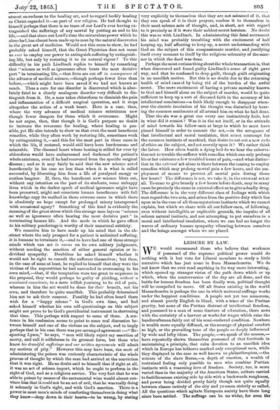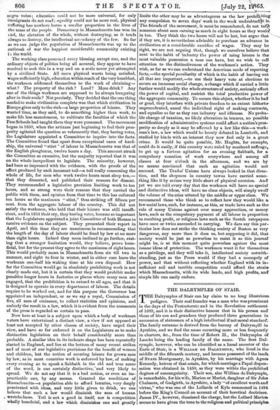LEISURE BY LAW.
WE would recommend those who believe that workmen if possessed of the supreme political power would do nothing with it but vote for Liberal members to study a little narrative which has just come in from Massachusetts. We do not know that we ever read anything in its way more interesting, which opened up stranger vistas of the path down which or up which, when the controversies of the day are all done, and the battle for human freedom has been finally won, political thought will be compelled to move. Of all States existing in the world Massachusetts is perhaps the one in which universal suffrage works under the happiest conditions. A people not yet too numerous, and almost purely English in blood, with a trace of the Puritan gravity, but none of the Puritan distrust of intellectual freedom, and possessed to a man of some tincture of education, there sows with the certainty of a harvest or works for wages which raise the handicraftsman fairly out of his semi-enslaved condition. Nowhere is wealth more equally diffused, or the average of physical comfort so high, or the prevailing tone of the people so deeply influenced by wide and lofty ideas. The people,—we speak of the masses,— have repeatedly shown themselves possessed of that fortitude in maintaining a principle, that calm devotion to an unselfish idea which in Europe has hitherto marked only exceptional men, while they displayed in the case so well known to philanthropists,—the seizure of the slave Burns,—a depth of emotion, a wealth of restrained feeling only possible to men who combine Puritan instincts with a reasoning love of freedom. Society, too, is more varied than in the majority of the American States, culture carried to fastidiousness existing side by side with a backwoods roughness, and power being divided pretty fairly though not quite equally between classes entirely of the city and ye omen strictly so called. All the questions which agitate European society have there long since been settled. The suffrage can be no wider, for even the
aegro votes ; education could not be more universal, for only immigrants do not read; equality could not be more real, physical suffering has nowhere borne a smaller proportion in the lives of the mass of the people. Democracy in Massachusetts has won its end, the elevation of the whole, without destroying, as it tends always to destroy, the intellectual ascendancy of the few. So far as we can judge the population of Massachusetts was up to the outbreak of war the happiest considerable community existing in the world.
The working class possessed every blessing except one, and the ordinary objects of politics being all secured, they appear to have resolved to seek this in a way and on a scale never yet attempted by a civilized State. All mere physical wants being satisfied, wages sufficiently high, education within reach of the very humblest, the workmen addressed themselves to the work of obtaining— what ? The property of the rich ? Land ? More drink ? Any one of the things workmen are supposed to be always hungering after in their souls ? Not precisely. They decided that the one thing needed to make civilization complete was that which civilization in Europe gives only to the rich—a large proportion of leisure. They wanted time, as they said, to do something higher than work, to make life less monotonous, to cultivate the faculties of which the Free Schools had taught them they were possessed. The movement began in 1850, when the artizans just beginning to feel their pros- perity agitated the question so vehemently that, they having votes, the Legislature appointed a Committee to inquire into the facts. The Committee found that apart from exceptional cases of hard- ship, the universal "stint " of labour in Massachusetts was that of the English ploughman, twelve hours a day. This amount struck the Committee as excessive, but the majority reported that it was on the whole inexpedient to legislate. The minority, however, bad been so impressed with the evidence, with the proofs of the effect produced by such incessant toil—a toil really consuming the whole of life, for men who work twelve hours must sleep ten,— that they dissented, and published their reasons for dissent. They recommended a legislative provision limiting work to ten hours, and so strong were their reasons that they carried the public with them, and opinion from that time to this has enforced ten hours as the maximum " stint," thus striking off fifteen per cent. from the aggregate labour of the country. This did not satisfy the workmen, who held that their leisure was still insuffi- cient, and in 1864 their cry, they having votes, became so important that the Legislature appointed a joint Committee of both Houses to receive evidence on the subject. They presented their report in April, and this time they are unanimous in recommending that the length of the day of labour should be fixed by law at no more than eight hours. Indeed they seem inclined to go further, stat- ing that a stronger limitation would, they believe, prove bene- ficial, but for the present they agree to the maximum of eight hours. This would probably mean in Massachusetts from six till two in summer, and eight to four in winter, and in either case leave the workman one-half his waking time at his own disposal. How far the Committee would go in absolutely prohibiting work is not clearly made out, but it is certain that they would prohibit under penalties longer hours in factories or places where many men are engaged, that the prohibition is to extend to all ages, and that it is designed to operate in every department of labour. The details require to be worked out, and for this purpose the Governor has appointed an independent, or as we say a royal, Commission of five, all men of eminence, to collect statistics and opinions, and embody the result in a law, which it is evident from the comments of the press is regarded as certain to pass.
Now here at least is a subject upon which a body of workmen voters have entertained a distinct view, a view if not opposed at least not accepted by other classes of society, have urged their view, and have so far enforced it on the Legislature as to make distinctive legislation on their behalf considerably more than probable. A similar idea in its inchoate shape has been repeatedly started in England, and lies at the bottom of many recent strikes and of most of our legislative provisions for the benefit of women and children, but the notion of securing leisure for grown men by law, as in most countries work is enforced by law, of making every evening so to speak a Sabbath in the old and true sense of the word, is one certainly distinctive, -and very likely to spread. We do not say that it is a bad notion, or even an im- practicable one, by any means. Granted the conditions of Massachusetts—a population able to afford luxuries, very deeply penetrated with ideas, and very little given to drink, we can believe that such a law would diminish the sum of human . wretchedness. Toil is not a good in itself, nor is competition wholly beneficial, and a law which diminishes one and greatly
limits the other may be as advantageous as the law prohi sting any compulsion to seven days' work in the week undoubtedl is.
The friends of the movement, it must be remembered, do not tali nonsense about men earning as much in eight hours as they would. in ten. They think the two hours will not be lost, but argue that if they are, it is nevertheless advisable to purchase an advance in civilization at a considerable sacrifice of wages. They may be right, we are not arguing that, though we ourselves believe that next to the habit of 'industry the power of using leisure is the most valuable possession a man can have, but we wish to call attention to the distinctiveness of the workmen's action. They wish, as far as we can understand the American mode of reporting facts,—the special peculiarity of which is the habit of leaving out all that are important,—to use their heavy vote at elections to secure an immense social change, a change which if carried a little further would modify the whole structure of society, seriously affect the power of capital, and restrict the total productive power of the aggregate community. To secure this object, whether it be bad or good, they interfere with private freedom to an extent hitherte unprecedented, annul the individual right of making contracts, and equalize so far as they can industry and idleness. No proba- ble change of taxation, no likely alteration in tenures, no possible modification of administrative systems could affect a nation's pros- perity so deeply as it may be affected by a law like this—a work- man's law, a law which would be keenly debated in Lambeth, and studied by hinds with an interest they now feel only in a great. crime. It would be quite possible, Mr. Hughes, for example, could do it easily, if this country were ruled by manhood suffrage, to get up a furious agitation for an evening Sabbath, for a compulsory cessation of work everywhere and among all classes at four o'clock in the afternoon, and we are by no means convinced that such an agitation would not succeed. The Trades' Unions have always looked in that direc- tion, and the shopmen in country towns have carried some- thing like it by means very little short of physical coercion. And yet we are told every day that the workmen will have no special and distinctive ideas, will have no class objects, will simply swell the volume of the cries uttered by the middle or upper class. We recommend those who think so to reflect how they would like a. few social laws, such, for instance, as this, or trade laws such as the rule of many Unions against over many apprentices, or money laws, such as the compulsory payment of all labour in proportion to resulting profit, or religious laws such as the Scotch ratepayers have once or twice succeeded in carrying. We dare say this par- ticular law does not strike the thinking society of Boston as very dangerous, any more than it does us, but supposing it did, that society would be just as powerless to resist it as this journal might be, is at this moment quite powerless against the most insane ideas of protection. The workmen want it for themselves as a privilege, and they will take it, intellectual society notwith- standing, just as the Peers would if they had a monopoly of power, and that without reflecting whether England with its in- sufficient soil and terrible competition could afford the strain which Massachusetts, with its wide lands, and high profits, and simple life can easily endure.































 Previous page
Previous page